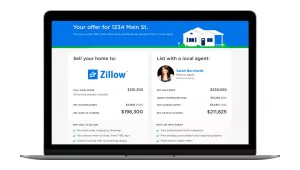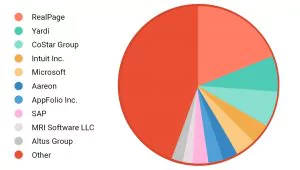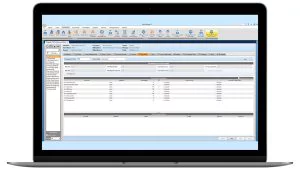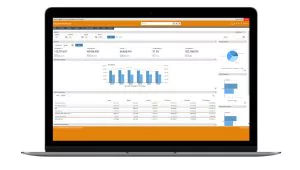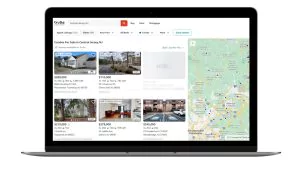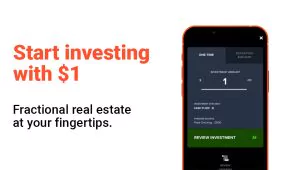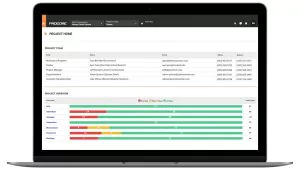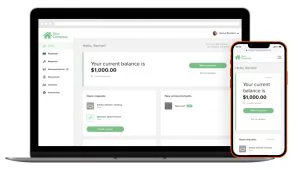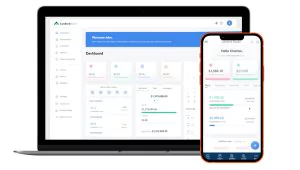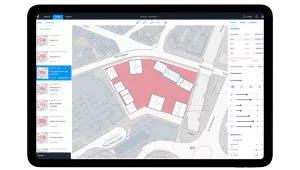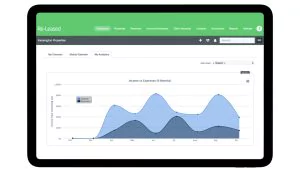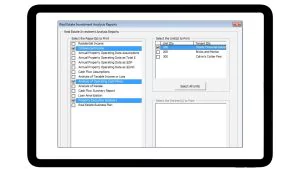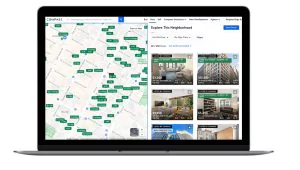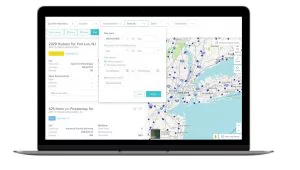During Covid-19, managing properties and executing transactions have become a real headache for many real estate businesses. To survive never-ending lockdowns, the real estate sector had to introduce technological solutions. Real estate software technologies, also known as PropTech, allow companies to effectively manage the workforce and satisfy client demands, even when strict quarantine restrictions are in place.
Still, many business executives may resist technologies due to being puzzled by a number of questions. Among them are whether it’s the perfect time to enter the real estate software market, what product to build, what major trends to take into account, how to gain a competitive advantage, and so on. Based on our 6-year expertise in software development, JatApp has prepared an overview of the real estate software industry, its key players, and hot trends to look for in 2022.
Is real estate software development worth your investment?
Even though the last two years were challenging for most sectors, the prospects of the real estate software market seem rather promising. The global real estate market size is projected to reach the compound annual growth rate (GAGR) of 9% by 2024. The report from Mordor Intelligence shows that the global real estate software industry will be worth $13.46B by 2026. The GAGR is expected to increase to 12.2% between 2021 and 2026.
Cloud-based Proptech will witness stable market growth in the next few years. The market share of cloud-based real estate solutions will increase up to 8.7% by 2026. More and more real estate businesses will rely on cloud-deployed software due to its cost-effectiveness, faster data access, and improved scalability. It’s safe to say that real estate software development is worth investing in 2022.
What are the major market drivers?
While most industries were hit hard by the pandemic, many PropTech companies continue to flourish despite all the challenges. Here are a few drivers of such market growth.
Remote work and social distancing
Historically, face-to-face meetings were important for conducting business in real estate. Social distancing regulations forced many companies to adopt technologies that would help to perform real estate activities, like selling properties, purchasing homes, having property site visits, and others. The work-from-home policy has led to the widespread adoption of cloud technology. The cloud-based solution enabled the real estate companies to get the work done from any location.
The need for data-driven decision
Finding out how much a property costs can be really hard for homebuyers and sellers. That’s why, in the past, this task was assigned to brokers. Today, such companies as Zillow reduce some of the guesswork using data to provide an estimate on the worth of a property. These PropTech companies incorporate various types of data for home valuation, including zip code, the number of bedrooms, the total area, seasonal factors, market trends, and many other parameters. Equipped with such technologies, sellers and buyers can list properties for a reasonable price and make relevant offers respectively.
Zillow home price estimator
Increasing operational costs
Real estate businesses are suffering from increasing operational costs. The rising prices of land and construction materials coupled with growing market competition require companies to find new ways to remain profitable.
Software technologies allow real estate agencies to optimize their processes, track the budget, and not recruit a workforce for tasks that can be easily automated. The implementation of cloud solutions is an effective business strategy adopted by many real estate companies to streamline their resources. One report shows that nearly half of survey respondents believe that their IT costs could be reduced up to 50% by incorporating cloud infrastructure.
The change in client habits
During the pandemic, customers had to turn to the technologies to purchase, rent, or lease a property. Even now, when the world slowly recovers from Covid-19, clients still rely on technologies due to the convenience they offer. Software solutions give clients an opportunity to engage with real estate agencies from the comfort of their homes. Such technologies as cloud-based platforms ensure immediate access to the information that users need.
Competition and market leaders
In 2022, the competition will remain high in the PropTech market. The global real estate software market size is predicted to increase by $7.2B by 2025 compared to $6.7B in 2020. In 2021, nearly 8,000 companies offered real estate software solutions, which indicates a 300% increase over the past ten years. These numbers clearly show that it’s the perfect time to enter the market before the competition gets even stronger.
Some of the biggest real estate software vendors include RealPage, Yardi, CoStar Group, Intuit Inc., Microsoft, and others. These companies have profound experience in the industry and offer innovative PropTech solutions. It is also worth admitting that companies mentioned comprised 55.1% of the global real estate software development market. Let’s have a look at the diagram below to understand the market share of these leaders compared to other players.
2020 Real Estate Software Development Market Shares Split By Top Ten Software Providers and Others
Market segmentation
By deployment
There are two software deployment options: on-premise and cloud.
On-premise
On-premise software is installed on the hardware and located within the premises of an enterprise. It usually requires a software license for each end-user and/or server. Even though theoretically the data can be accessed from an off-site computer, it would still require a special technical setup. With an on-premise solution, you pay all software licensing, maintenance, and infrastructure costs. One of the biggest advantages of this deployment type is the opportunity for customization to align software services with the company’s needs.
Rent Manager is a PropTech company that has on-premise property management software, meaning that all information is securely stored within their own data center. On-premise software enables the customization of reports, data fields, documents, and much more.
An example of Rent Manager customization of data reporting
Cloud
Unlike on-premise software, cloud-based solutions are deployed on the Internet. This allows users to have immediate remote access to the databases, servers, applications, and beyond from any device. Another difference lies in pricing. With cloud-based solutions, you no longer need to pay for managing your own infrastructure. You will be charged only for the computing resources you use on a monthly basis. This helps to decrease operating costs and scale your business in response to the market needs.
Cunio is a perfect example of a cloud-based solution. It is a software as a service (SaaS) property management platform that gets service providers and residents notified about what’s going on in the building. JatApp helped the company to build this notification microservice so that everyone would have instant access to maintenance requests, upcoming events, and announcements from any device connected to the Internet.
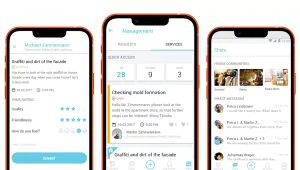
Cunio app functionality
By type
Real estate management
Real-estate management or property management software is the solution that allows real estate experts and landlords to monitor leases, gather rent, control finances, and track maintenance tasks. The technology is used to manage offices, industrial, retail, or residential spaces.
As an example, RealPage is one of the biggest property management software providers that offer marketing, asset optimization, leasing, and resident services. Its cutting-edge SaaS platform enables to streamline online real estate management while improving the resident experience through online payments and billing, notifications, maintenance requests, and so on.
Real page executive dashboard
Multiple listing service
Multiple listing service (MSL) software refers to the real estate platform that provides a database of all properties available for sale in a specific location. In such a way, buyers have access to the listings of homes, whereas sellers get connected to prospective homebuyers through their real estate agent.
Trulia is one of the leading real estate companies that provide the listings of homes available for both sale and rent. The company goes beyond the typical MSL by providing insights from locals and presenting a visual breakdown of crime statistics. This gives clients a better idea of what living in a certain house is really like.
An example of Trulia app functionality
Real estate crowdfunding
Investing in real estate has long been unaffordable for many. Real estate crowdfunding has become a game-changer, as you no longer need to have a lot of money to invest. Here’s how it works: a real estate crowdfunding platform acts as an agent connecting investors with real estate projects. A large pool of investors funds a project so that each of them does not need to contribute large amounts of money.
Concreit is a real estate crowdfunding platform that allows investors to contribute as little as $1. They can also request a withdrawal at any time via the application. Its innovative cloud-based software facilitates on-demand withdrawals and weekly payouts. The cloud accounting engine helps to ensure a real-time user experience.
Concreit app functionality
Construction management
Construction management software optimizes the project management process helping contractors and construction managers to be more efficient. The technology gives an opportunity to plan schedules, make updates, share changes in the planning process, and so on.
Procore is a construction management platform that offers a wide range of tools for project drawings, meetings, emails, bidding, scheduling, submittals, and so much more. This cloud software makes it easy for users to handle construction tasks when on the go.
An example of Procore functionality
By application
Commercial real estate
Commercial real estate software refers to the product that helps to lease and manage real estate used for business purposes. Such a software ensures tenant and owner communication, as well as includes additional functionality such as calculating fees and property maintenance.
Buildium is a cloud-based property management software that helps real estate agencies to manage property portfolios, including maintenance, vacancy management, rent payments, and accounting.
An example of Buildium functionality
Residential real estate
Residential real estate solution is software for managing any property used for housing individuals, families, and groups of people. The technology is designed for landlords to find, screen, and manage tenants, address their maintenance needs, and handle accounting.
Landlord studio is a modern cloud-based app that automates rental management tasks making the lives of owners much easier. The property management solution is used for tracking costs and income, screening renters, generating reports, creating listings, and collecting rental payments online.
Landlord Studio dashboard
By end-user
Architects and engineers
Real estate software for architects and engineers provides tools for customized construction and efficient design. A fitting example here is Spacemaker, a cloud-based technology driven by artificial intelligence. The software empowers architects to cooperate, analyze, and design properties.
Spacemaker design page
Project managers
Real estate project management software helps to schedule, budget, plan, and monitor the tasks related to the real estate industry. Examples of such tasks include tracking contract obligations or making cost estimates of marketing a property for sale.
Re-lease is software that helps to track lease events and other project-related dates. Automated notifications help users to deal with the workload, while an analytics dashboard offers an analysis of the revenue growth. Cloud-based technology also helps to keep up with ongoing project details even when you are on the move.
Re-lease analytics feature
Real estate agents
Software products for real estate agents refer to technologies that help to facilitate the buying, selling, and renting processes. These solutions can assist with various tasks from expense tracking to lead generation tools.
Real Geeks offers customer relationship management (CMR) software for the real estate industry. With this solution, agents can organize clients’ calls, emails, and leads. The solution ensures that users gets notified about each step of their sales process journey.
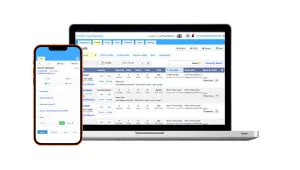
Real estate investors
Real estate investors use digital solutions to decide whether the property is worth their investments. RealData is an example of such technology. The product empowers investors to better analyze potential deals and evaluate the returns on property, navigating them through commercial, multifamily, and condo projects.
RealData customized menu of the investment analysis report
What technologies in real estate have the biggest impact on the market?
In order to set yourself apart from your competitors, you have to be aware of the latest technology trends in the real estate industry. Let’s take a closer look at the solutions that have disrupted the PropTech sector.
Artificial intelligence
Artificial intelligence (AI) refers to the form of computer science that utilizes computers to complete tasks, which were traditionally performed by human beings. AI-powered solutions are able to generalize, learn from prior experience, reason, and discover meaning. You can use this technology to proceed with your work in a much faster way than what we as humans are capable of.
AI is the future of real estate technology due to the current shortage of homes for sale caused by the pandemic. The use of AI has enabled brokers to predict which homes are most likely to sell, thereby helping them to stay afloat during such challenging times.
Compass is one of the companies that employ AI to help agents to gain access to new listings. The solution forecasts which homes will be sold within the next 12 months. The technology does so by processing the data associated with the property, like what the price for the home is in that particular location, how long the resident occupied the place, when the home was last sold, and so on. Real estate agents report a 94% higher likelihood of getting a desired listing with Compass than not.
Compass user interface
Big data
Big data technology is designed to analyze information from massive amounts of data to help you make a more informed decision. In real estate, big data is used for different purposes, like making property valuations, predicting customer behavior, offering insights into properties, anticipating market trends, and so on.
Reonomy is a company that offers data for real estate agencies, commercial services providers, and financial institutions to gain a better understanding of the market. Reonomy is committed to helping clients optimize their research processes and discover new business opportunities.
Reonomy user interface
The Internet of Things
The Internet of Things (IoT) is the network of devices with in-built sensors connected to the Internet. The technology allows gathering data from different devices and incorporating analytics to make recommendations, identify patterns, and detect potential problems before they happen.
An on-point example here is a French startup that delivers an IoT-enabled power bank rental platform. JatApp assisted the company in building a software that enables the staff to stop being attached to their workplace. The station consists of power banks and a base. To rent a power bank, an employee needs to use a mobile app to register and get verified by the admin. When the worker wants to return the device, they can simply put it in a vacant place on the base.
Illustration of the power bank rental platform
Real estate industry after the pandemic
The PropTech industry is evolving after the pandemic and is projected to boom in the years to come. The demand for real estate software, like cloud-based platforms, will only grow due to the need for remote working and cost-effective solutions. If you are considering investing in PropTech, it’s the right time to find a software provider that will help your business to set itself apart from other industry players.
JatApp has solid experience in custom software development for the real estate industry. Our company prides itself on providing more than 200 high-quality software products that have 99% satisfaction rates. One of the examples of such projects is a property management platform. The product helped the client to increase customer retention by 10% and receive a return on investment only 7 months after the product launch.
If you have an idea for your dream project, please, feel free to contact us and let our team help you.
